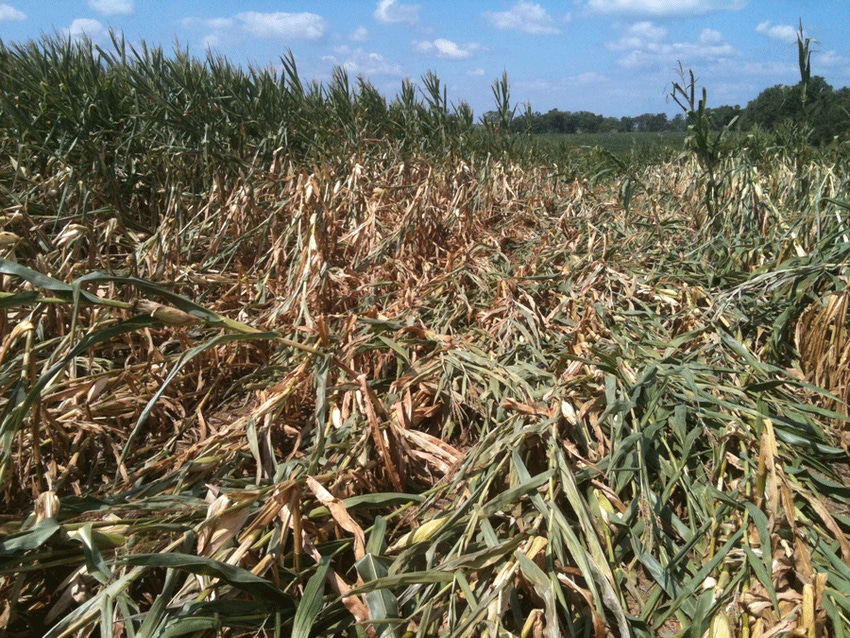
With crop insurance destined to be a key component of the next farm bill, what are insurance agents keeping a close eye on as the legislation takes shape?
On May 17, Ruth Gerdes, President of Nebraska-based Auburn Agency Crop Insurance Inc., testified before the House Subcommittee on General Farm Commodities and Risk Managementon industry concerns and kudos for the developing farm bill. Shortly after, Gerdes, who also farms, spoke with Farm Press. Among her comments:
On how her testimony was received…
“I think the testimony was well-received. Probably the most interesting part of it — as an agent who’s been in this work for a long time — was the fact that Congress had no idea the (latest) SRA (Standard Reinsurance Agreement) negotiated had such a strong overreach into the agents’ world.”
“That was pretty shocking to the members. You certainly don’t often see (California Rep. Jim) Costa — who isn’t a member of the subcommittee — come to the hearing to specifically talk about that. Having testified many times over 27 years, I thought that was unusual. You don’t see that happen very often.”
More on the Standard Reinsurance Agreement…
“The SRA is the agreement between the USDA that is negotiated by the Risk Management Agency (RMA) and the AIPs (Approved Insurance Providers).
“It’s a five-year agreement and was last renegotiated in 2010 to begin in 2011. As part of that negotiation they put a cap on agents’ commissions. That devastated, particularly, the specialty crops and was a tremendous overreach.
“I found that the congressmen were most incensed about the fact they made this rule part of the SRA without any agent participation, any agent input. We don’t have a seat at the table because we don’t sign (the SRA). So, as agents that deliver this product, we had a real whammy handed to us in that SRA.”
Can that be rectified through the next farm bill? Will you have to wait for the next SRA negotiation for that to occur?
“Congress could certainly rectify it. The question is, this far in, how do you rectify something and not create unintended consequences? There is a lot of discussion about that.
“A simple thing to do that would be budget neutral would be for Congress to simply say ‘take the cap off agents and go back to the way it used to be.’ That was where companies and agents would negotiate based on what I perceive as the way insurance should work: the ability of the agent to work hard.
“As it stands now, we’re really quasi-employees of the companies even though we must pay our own health insurance, our own pensions, all our office staffs, all of that. It doesn’t matter whether you do a good job or bad job for your farmers -- you’ll get paid the same.
“That’s why it’s so offensive to agents like me who have worked for 27 years to build a book of business based on service.”
On crop insurance becoming the cornerstone of the next farm bill…
“It doesn’t surprise me. My farmers have been telling me for years that is their preference.
“The 2000 Agriculture Risk Protection Act (ARPA) bill incentivized farmers to do the right thing and purchase up (with crop insurance) and they’ve responded in droves. I believe the participation is something like 83 percent nationwide. That’s phenomenal.”
On the issues involving crop insurance and rice and peanuts…
“I’ve been around the rice issue on the periphery. I don’t sell rice (insurance).
“When you deal with a program as large as crop insurance, there’s a tendency to make a policy for corn, wheat, soybeans and grain sorghum and try to make the same thing work for rice and peanuts.
“The reason I’ve been around the periphery of rice is for four years we’ve been trying to get RMA to (produce) a rice policy. The policy has been held up for four years in their 508(h) process.
“I thought it be approved in April. Last week, I was told it had been sent out for another expert review. After four years I would have thought they could have come up with a policy that meets the needs of rice producers. And I’m very supportive of that – we have to have something actuarially sound that meets (rice producers’) needs.”
What in the Senate farm bill might be a problem from your perspective?
“Certainly what (Illinois Sen. Dick) Durbin and (Oklahoma Sen. Tom) Coburn did to limit the subsidy to $40,000 per producer would decimate the crop insurance industry. The question they asked the GAO (General Accounting Office) was ‘can you save money if you limit the subsidy.’ The obvious answer is ‘yes, you can save money.’ But what harm do you do in the meantime?
“There have been many people who have looked at that on the average. However, they didn’t consider high-dollar value, specialty crops.
“They also didn’t take into account high-risk ground. Where I live (in Nebraska) — and certainly in the South — there is plenty of high-risk ground. If they limit the subsidy to $40,000, then crop insurance will no longer be the cornerstone of farm policy.”
Workloads, banking, awareness
I was struck by the photograph included in your testimony showing the amount of paperwork required to sign someone up for crop insurance compared to the past. To deal with that paperwork, how much time do you spend with a client now compared to a decade ago?
“Now, I spend four or five times what I used to.
“Part of that is good because the policies have improved. I helped push the revenue policy through back in the 1990s. The ARPA bill helped improve (the industry) as well.
“But we’re still asking the farmers to pay an awful lot of money for crop insurance. So, much of the time I spend with them is evaluating (individual situations) – what if I do this? What if I do that?
“And how does that marry up to any farm program out there? With the last farm programs, we spent hours and hours on education regarding ACRE and how that interacted with crop insurance.
“I think time will (increase) as we go into the next farm bill. You’re talking about STAX, SCO (Supplemental Coverage Option) and ARC. And I think those are all good options.
“I’m a particular fan of (Texas Rep. Randy) Neugebauer’s SCO combined with the traditional crop insurance. I think that’ll give the farmer the most bang for his buck. But I think it’ll also give the taxpayer the most bang for the buck.
“Farmers must pay in order to participate in these plans. So, when they’re spending their own dollar, it isn’t about going to the highest level to get the most ‘free’ money possible. It’s about getting the coverage that’s the most optimum for their farm.
“So, we do spend an awful lot of time with farmers. And that’s what I love to do so I’m not unhappy with that.
“I am unhappy with the enormous amount of regulation. (For example) if you transpose a number, you can’t correct it after the fact. … That’s crazy.”
On trend adjusted yields…
“These are fabulous, extremely helpful. You can hang your hat on the science behind them. It makes sense – for the farmer and the taxpayer.
“The more records you have in a farmer’s database, the more accurate you’ll be actuarially. That means you’ll spend taxpayer money well.
“One of the frustrating things on our own farm is that, due to conservation, we maintain a fairly strict rotation. That means it takes us 20 years to get a 10-year database.
“With the trend adjusted yields, you’re being rewarded for doing conservation correctly.
“We’re just in a corn/soybean rotation on our farm. Some farms have four and five crops that they rotate. Trend adjusted yields would be very appropriate for them.”
On personal transitional yields…
“I’m a huge fan of this because it incentivizes farmer to keep accurate records. If someone is trying to bring fraud into the system by skipping around with different crops in different counties to pick up insurance money, going to personal T yields will stop it cold.
“As long as I’ve been in the business, I have great APHs (Actual Production History) but I’ve also had years that would have been devastating. Think about the 2011 floods – (many producers) have hard hits in their database. Well, if they’ve kept good records, their personal T yields will still be significantly higher than the county average.
“It cuts both ways: You incentivize farmers to do the right thing and stop the potential for abuse on county averages.”
On agriculture bankers and crop insurance being a main focus of the next farm bill…
“I think they’ll be thrilled. I spend a significant part of winters working with bankers, making sure they know what to do, what to watch out for, any potential traps in rule changes.
“When a rewrite goes on, I get called many, many times to provide information on clients. It’s a team effort between the farmer, myself and the banker. We can say ‘if they price is this at harvest and the yield is this, what will that mean to the bottom line?’
“One thing all the bankers I work with tell me is ‘if we lose the subsidy to crop insurance it will crash the U.S. ag economy.’ And it will crash the U.S. ag economy, without a doubt.”
Anything else?
“Farmers need to be tuned in to the potential run on the subsidy. That’s the first thing to be aware of.
“Second, they should be aware that (crop insurance) agents won’t change the way we do business. We’ll still provide the same service. But over time if this cap on agents persists, it will hurt the farmers more than anyone else.
“Already a lot of agencies are selling out to others, to banks. The cap has made it too prohibitive. So, farmers (could lose) the one-on-one resource they enjoy if the cap stays.”
About the Author(s)
You May Also Like






